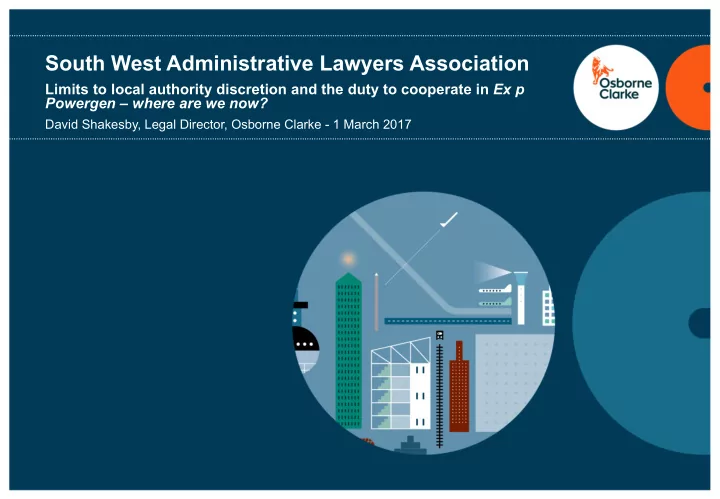

South West Administrative Lawyers Association Limits to local authority discretion and the duty to cooperate in Ex p Powergen – where are we now? David Shakesby, Legal Director, Osborne Clarke - 1 March 2017
osborneclarke.com Background Local authority powers • Local authorities are creatures of statute - where they hold land, they must act to further the statutory objects, and for the statutory purpose for which it is held - R v Somerset County Council Ex p. Fewings [1995] 1 WLR 1037 • A local authority must discharge its functions so as to promote, and not thwart the policy and objects of a relevant statutory power - Padfield v MAFF [1968] AC 997 • It can be appropriate to consider the underlying purpose of the decision maker - acting on the basis of an improper collateral purpose can render a decision unlawful - R v Braintree District Council Ex p. Halls (2000) 80 P&CR 226 1
osborneclarke.com R v Warwickshire County Council Ex p. Powergen [1997] EWCA Civ 2280 Facts: • P applied to WCC for outline PP to develop a supermarket, petrol station and associated road improvements, including road widening, a bridge, a right turn lane and a pedestrian crossing. • WCC as highway authority objected on the ground the road proposals were "unsafe". • The LPA rejected the planning application. • On appeal, the Inspector rejected the safety objections and decided (after considering much expert evidence) that the proposals were acceptable in planning terms and were safe. • WCC refused to enter into a s278 agreement in order to enable the road improvements to proceed. • P sought to judicially review that refusal. 2
osborneclarke.com Powergen (continued) Decision: • WCC's insistence that it retained an "independent discretion" whether or not to enter into the s278 agreement was wrong. • Had it been correct, the SoS's decision to grant PP would only be capable of implementation if the highway authority agreed. • The safety implications had been fully considered and tested by the Inspector; his conclusions were both reasonable and final on the question of safety. • For the highway authority to refuse to cooperate in entering into the s278 was both perverse and unreasonable in a true Wednesbury sense. • On appeal, the CA added that once the highway authority lost on the safety issue, it should (like the LPA) be expected to cooperate with the implementation of the PP. 3
osborneclarke.com The Manydown Company Limited v Basingstoke and Deane Borough Council Facts: • A dispute about an overage agreement. • M granted a lease for 999 years to BDBC. • Land acquired pursuant to s226(1) TCPA 1990 with express intention of promoting the site through the Local Plan for residential development. • Overage agreement - 50% of the uplift in value to be paid to M on grant of PP. • 2006 - problems with the site over drainage, water supply and road capacity - BDBC decided to temporarily suspend promotion of the site in order to resolve them. • 2011 - BDBC as LPA decide to remove site from the draft Core Strategy as it was not "available" for development, notwithstanding that most issues were capable of resolution. • Hint of improper collateral purpose (avoiding overage). 4
osborneclarke.com Manydown (continued) Decision: • BDBC's actions were unlawful - it had sought to use its control of the site as a means of delaying development where it had acquired the site (with public money) for the express purpose of promoting development. • Court made it clear that the decision did not impact on the final Core Strategy or the discretion of the Inspector who would determine that, but it was improper for BDBC to exclude the site from the draft CS on the basis that it was "unavailable" when it was only unavailable because BDBC had decided as landowner that it should not be developed. • Council sought to argue that it had a general power under s1 Localism Act 2011. The Court disagreed as although s1 was very wide ranging, BDBC had acquired the land and continued to hold it under s226(1). The land had not been appropriated to a different purpose and therefore BDBC's actions had to be consistent with and promote/further that purpose. 5
osborneclarke.com Conclusions • A local authority's discretion in some circumstances can be restricted to one lawful course of action, in which case they must (and can be compelled) to take it. • If an issue relevant to the exercise of discretion has already been determined (whether by a 3rd party, or by a previous decision of the authority), the local authority must act in a manner which is consistent with that decision. • Where a local authority has acquired land for a specific purpose, it must act to promote that purpose and cannot act inconsistently with it, or alternatively it must (lawfully) appropriate that land to a different purpose. • The fact that a local authority might have other more general powers under which it could act will not assist if it is under a duty to cooperate arising from the specific power under which it is holding land. 6
osborneclarke.com osborneclarke.com Thank you osborneclarke.com 7 7
Recommend
More recommend